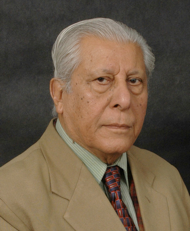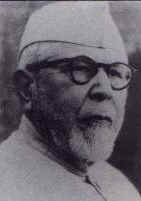Related Research Articles

Aligarh is a city in the state of Uttar Pradesh in India. It is the administrative headquarters of Aligarh district, and lies 342 kilometres (213 mi) northwest of state capital Lucknow and approximately 130 kilometres (81 mi) southeast of the capital, New Delhi. The cities and districts which adjoin Aligarh are: Gautam Buddha Nagar, Bulandshahr, Sambhal, Badaun, Kasganj, Hathras, Etah and Mathura. As of 2011, Aligarh is the 53rd most populous city in India.

Sir Syed Ahmad Khan, also spelled Sayyid Ahmad Khan, was an Indian Muslim reformer, philosopher, and educationist in nineteenth-century British India. Though initially espousing Hindu–Muslim unity, he later became the pioneer of Muslim nationalism in India and is widely credited as the father of the two-nation theory, which formed the basis of the Pakistan movement. Born into a family with strong ties to the Mughal court, Ahmad studied science and the Quran within the court. He was awarded an honorary LLD from the University of Edinburgh in 1889.

SirZiauddin Ahmad was an Indian mathematician, parliamentarian, logician, natural philosopher, politician, political theorist, educationist and a scholar. He was a member of the Aligarh Movement and was a professor, principal of MAO College, first pro vice-chancellor, vice chancellor and rector of Aligarh Muslim University, India.
Abdullah Sahib was the Governor of Gilgit Agency during Dogra rule and was one of the earliest graduates of Muhammadan Anglo-Oriental College. He was the father of Pakistani writer Qudrat Ullah Shahab.
The Scientific Society of Aligarh was a literary society founded by Sir Syed Ahmad Khan at Aligarh, India. The main objectives of the society were to translate Western works on arts and science into vernacular languages and promote western education among the masses.

Justice Syed Mahmood was Puisne Judge of the High Court, in the North-Western Provinces of British India from 1887 to 1893, after having served in the High Court in a temporary capacity as officiating judge on four previous periods since 1882.

Ubaidullah Al Ubaidi Suhrawardy was a Bengali Islamic scholar, educationist and writer from Midnapore.

Jamal Khwaja was an Indian philosopher.

Khwaja Muhammad Yusuf was one of the top lawyers and landowners of Aligarh, a small but historically significant town in the ‘doab’ region of the state of Uttar Pradesh in northern India. He was among the first Indian Muslims to understand the nature and gravity of the issues posed by contemporary European colonialism. He was an Islamic liberal who believed that modern, Western-style education was essential for the survival of Indian Muslims in the contemporary world.

Abdul Majeed Khwaja was an Indian lawyer, educationist, social reformer and freedom fighter from Aligarh. In 1920, he along with others founded Jamia Millia Islamia and later served its vice chancellor and chancellor.
Syed Afzal Ali was a famous personality from Bulandshahr. Four of his sons were bestowed with the title of Khan Bahadur by British India, a rare distinction in a family of Indian history.

Nawab Muhammad Hayat Khan Khattar (1833–1901) was a Punjabi Muslim who served the Government of British India and rose to considerable distinction.
Maharaja Sir Mohammad Ali Mohammad Khan, Khan Bahadur, KCSI, KCIE was the Raja of Mahmudabad from 28 June 1903 to 23 March 1931 and a noted politician, zamindar of British India.
The Aligarh Movement was the push to establish a modern system of Western-style scientific education for the Muslim population of British India, during the later decades of the 19th century. The movement's name derives from the fact that its core and origins lay in the city of Aligarh in Central India and, in particular, with the foundation of the Muhammadan Anglo-Oriental College in 1875. The founder of the oriental college, and the other educational institutions that developed from it, was Sir Syed Ahmed Khan. He became the leading light of the wider Aligarh Movement.
Sir Theodore Morison was a British educationalist who served as a Member of the Council of India and Director of the University of London Institute in Paris. He is best known as an interpreter of Muslim life in India.
Siddons Union Club, commonly referred to as 'The Siddons Union', was established in the year 1884 at Muhammadan Anglo-Oriental College, the present day Aligarh Muslim University. The club was named after Henry George Impey Siddons, the first principal of the college. the Siddons Debating Union Hall, the debating chamber, was constructed which consist of a debating hall, a library and a reading room. The Cambridge Union Society gave birth to debating societies of the prominent universities of the world namely Oxford Union, Yale Political Union. Siddons Union Club hosted a number of National and International Politicians, Writers, Nobel Laureates, Players, and Journalists, including the Dalai Lama, Mahatma Gandhi, Maulana Abul Kalam Azad, Jawahar Lal Nehru.
Muhammadan Anglo-Oriental College was founded in 1875 by Sir Syed Ahmad Khan, initially as a primary school, with the intention of turning it to a college level institution. It was inspired by the Cambridge education system. It started operations on Queen Victoria's 56th birthday, 24 May 1875.

Maulvi Mohammad Zakaullah or Munshi Zakaullah was a British Indian Urdu writer and translator. He wrote Tarikh-e-Hindustan, a fourteen-volume compilation of Indian history in Urdu.

Mahomed Hameed Ullah Khan, also known by his title Nawab Sarbuland Jung Bahadur was an Indian judge.

The history of Aligarh Muslim University begins with the Aligarh movement, which was a movement to establish a Western style of education for the Muslims of British India. The movement was pioneered by Sir Syed Ahmed Khan, who founded the Muhammadan Anglo Oriental College in Aligarh. Sir Syed retired at Aligarh, and undertook the charge of raising funds for the college, and supervising the construction of the campus.
References
- 1 2 3 4 "In Memoriam. Haji Moulvi M. Samee-Ullah Khan Bahadur, C.M.G." (PDF).
- ↑ Muhammad, Shan (1978). The Aligarh Movement. p. 131.
- ↑ Parekh, Rauf (2016-05-30). "LITERARY NOTES: A forgotten hero's rare 19th-century Urdu travelogue". DAWN.COM. Retrieved 2023-07-26.
- ↑ Kareem, Sayyad Abdul. تذکرہ مولوی سمیع اللہ خان مرحوم [Remembrance of Maulvi Samee Ullah Khan, deceased] (in Urdu).